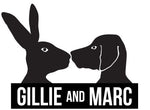New public art exhibition raises awareness of plight of chimpanzees
Published May 2022

The interactive display will teach people about our close cousins
Public artists and activists Gillie and Marc today announce the latest exhibition coming to the UK – ‘Chimps Are Family’ – as 80% of the 150,000 chimpanzees across the world will face a population decline over the next 30 years.
To coincide with World Endangered Species Day on Friday. May 20, the free public exhibition at London Bridge City will feature 28 chimps demonstrating 18 different behaviours such as love, grief, and tool use, illustrating the similarities between us and the animals with which we share 98% of our DNA.
Well-known in London for their recent public sculpture, ‘ The Orphans ’, a project that brought awareness and much-needed funds to orphaned baby elephants. Gillie and Marc are now moving the spotlight onto chimpanzees and giving people the chance to get up close and personal with our cousins and save them, before it’s too late.
The sculptures are designed to be interactive and engaging and the public is encouraged to get as close as they want, touching their faces, examining their hands, and even giving them a hug.
Gillie and Marc Schattner, said: “While we were studying chimps, we were absolutely blown away by how similar they are to us! We were inspired by observing the behaviours we share with them and the relationships they form, especially between mother and child.
“We really hope that this sculpture will help people to see the very real similarities between us and chimps. They laugh at funny things, get cross with one another, and have wonderful bonds of friendship.

“Despite our connection to them, chimpanzees are endangered, and it’s because of our actions. With our cities expanding at a rapid rate, their habitat is being destroyed, making space for housing, agriculture, mines, and roads. The chimps struggle to find enough food, getting them into dangerous situations leading to human-wildlife conflict. They are also targeted by hunters for bushmeat or to sell the babies for the illegal pet trade. And all these interactions with humans have left them sick, catching our diseases, the worst being Ebola. Ebola has killed hundreds and thousands of chimps since the 1980s.
“We hope that once people see how similar we really are, they will be moved to help protect them. We look forward to rolling out the work in May and bringing some much-needed Chimps to London.”


